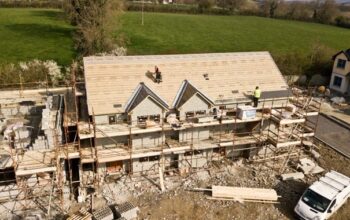Real Estate can be a high reward investment, but it also comes with its fair share of risks. From property damage to liability claims, unforeseen events can have significant financial consequences for investors. That’s why having the right insurance coverage is crucial for ensuring that your investment is protected and to ensure that potential losses are mitigated as far as possible. This article will explore the top eight real estate insurance solutions that every investor should consider. Check this page to learn more about real estate insurance.
1. Property Insurance
First up on our list, and perhaps the most fundamental coverage for those investing in real estate, is property insurance. It protects your investment property against damage caused by perils such as fire, theft, vandalism, and natural disasters like hurricanes or earthquakes.
Property insurance typically covers the physical structure of the property as well as any personal property (such as appliances or furnishings) contained within it. It is great for all round coverage and key for anyone investing in property.
2. Liability Insurance
Liability insurance, on the other hand, is slightly more specific. It provides protection to investors in the event that someone is injured on your property and holds you responsible.
This coverage can help cover all of the costs involved, from legal fees and medical expenses to damages awarded in a liability lawsuit. Regardless of the cause of injury on the property, liability insurance can safeguard your finances and assets from costly legal claims.
3. Rental Income Insurance
Next on our list is rental income insurance, also known as loss of income coverage. This type of insurance provides you with financial protection if your rental property becomes uninhabitable due to a cause covered by your policy (such as fire or water damage).
This insurance differs from property insurance in that while property insurance helps cover the damage, rental income insurance helps cover the lost rental income during the period of restoration.
Rental income insurance ensures that even when your property is temporarily out of commission, you still receive the revenue that you would otherwise have received if your property was in its usual condition.
4. Flood Insurance
Although floods can be categorised as natural disasters, standard property insurance policies typically exclude coverage for flood damage. For those properties located in flood prone areas, like coastlines or designated flood zones, this is something to be aware of. The effects of flooding can be detrimental to your building, so purchasing separate insurance for such events is a good idea.
5. Landlord Insurance
If you are a rental property owner, this one’s for you! Landlord insurance offers comprehensive coverage tailored to your unique situation or lease contract.
In addition to providing both property and liability coverage, landlord insurance may include additional protections for things such as loss of rental income, tenant caused damages, and legal expenses when related to evictions or lease disputes. This is a specialized type of coverage that ensures that landlords are adequately protected against the risks associated with renting out their properties.
6. Umbrella Insurance
Think of this as similar to gap cover. Umbrella insurance provides an extra layer of liability protection beyond the limits of your primary insurance policies.
It’s designed to kick in when the liability limits of your other policies have been exhausted and provides additional coverage for legal defence costs and damages. For those real estate investors with substantial assets, this may provide invaluable protection against large liability claims that exceed the limits of their underlying policies.
7. Builder’s Risk Insurance
Also known as construction insurance, builders risk insurance provides coverage for properties that are under construction or renovation. This insurance provides investors with protection against damage to the structure, materials, and equipment during the construction process.
Whether you’re building a new property or renovating an existing one, builder’s risk insurance ensures that your investment is safeguarded against damages or events that could delay your project.
8. Vacant Property Insurance
Last but not least is vacant property insurance. This type of insurance is essential for investors who own properties that are unoccupied for an extended period. Similar to umbrella insurance in that it often makes up the shortfall in coverage provided by other policies.
Standard property insurance policies often exclude coverage for vacant properties or impose restrictions on coverage after a certain period of vacancy. Vacant property insurance fills this gap by providing investors with protection against risks such as vandalism, theft, and property damage during long periods of vacancy.
Real estate insurance is therefore vital component of a comprehensive risk management strategy for investors. By carefully selecting the right insurance solution (or suite of solutions) for your properties, you can protect your investment from a wide range of potential threats and liabilities. You never know what is around the corner, and being well insured can help you weather any storm (literally). Don’t overlook the importance of insurance when it comes to your real estate investments—make sure you’re adequately protected with the right coverage.
Related Posts












